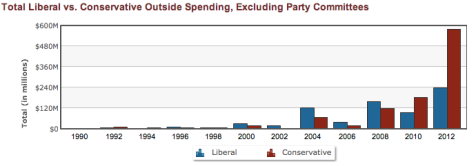The Citizens United v. Federal Election Commission decision by the Supreme Court in 2010 is starting to have a profound effect on politics and, more specifically, the ability for individuals to have an impact. The Citizens United case has expanded the rights of corporate personhood to allow corporations, unions, as well as wealthy individuals to contribute unlimited amounts to candidate elections, essentially flooding campaigns with money. This graph below from the Center for Responsive Politics shows the immense shift that outside money has seen since this decision.

Furthermore, a Republican party that has positioned itself as a party that will cut through regulations, lower taxes for the wealthy, and make cuts to many social programs (thus making it attractive for high-income individuals and corporations), has managed to have unparalleled success leveraging this new era of campaign spending. The immense disproportion in spending is shown below.

Why does all this matter? There is a legal movement that has been ongoing over the last few decades in the United States to grant corporations the rights of personhood. The whole Citizens United decision is based on an idea that by limiting the contributions that individuals, corporations, and labor unions can make, you are also limited their access to free speech. In the Citizens United case, the Court, with a conservative lean that shouldn’t be ignored, interpreted this as a principal violation of the First Amendment and significantly weakened the McCain-Feingold campaign finance reform bill that sought to limit contributions to $5,000 while preventing corporations from airing adverts in the 60 days up until a Presidential election.
The results have been incredible. In the first two weeks of October these outside groups on the election have spent a total of $180 million, with spending in favor of Romney outpacing that of Obama by over a 3:1 margin. Wealthy individuals such as Sheldon Anderson have threatened to spend as much as $100 million on these shadowy outside groups to defeat President Obama. Super PACs and welfare non-profit groups, neither of which were able to spend money on elections before the Citizens United decision, have spent a combined $113.6 million this election while unions, a long time enemy of the increasingly corporation funded right, have managed to spend only $3.1 million. To make matters worse, these contributions are allowed to remain anonymous by some shift accounting so that we never actually know who is contributing what.
In the end, campaign finance has turned into an arms race among the elite and corporations and is a situation in which we all lose. As if the plight of everyday Americans was already largely ignored, this new era of campaign finance now forces candidates to court the support of these wealthy individuals and corporations in order to have any chance at becoming elected. A Constitutional amendment has been put forth by Bernie Sanders of Vermont that would seek to state that;
- Corporations are not persons with constitutional rights equal to real people.
- Corporations are subject to regulation by the people.
- Corporations may not make campaign contributions or any election expenditures.
- Congress and states have the power to regulate campaign finances.
Unfortunately, such an amendment will receive heavy opposition by the very groups it seeks to limit and as we saw with lobbying in regards to climate change and healthcare reform, what’s best for the citizenry is hardly in the interests of these well funded and powerful groups.

